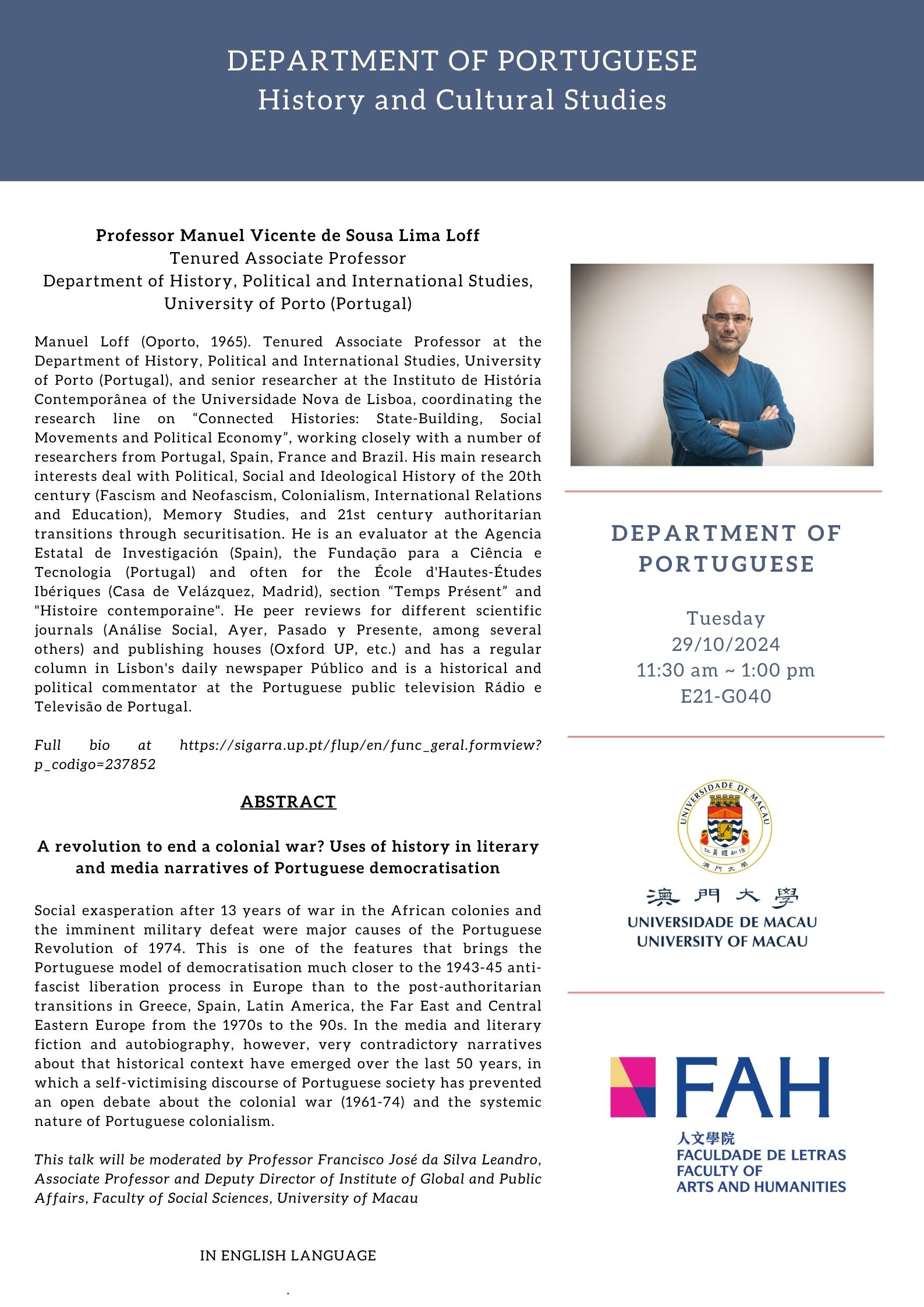

UM-FAH-DPORT: Seminar by Professor Manuel Loff on “A revolution to end a colonial war? Uses of history in literary and media narratives of Portuguese democratisation”
2024-10-29 @ 11:30 am ~ 1:00 pm
Dear Professors and Students,
We are most pleased to invite all to attend the following Seminar on “A revolution to end a colonial war? Uses of history in literary and media narratives of Portuguese democratisation” by Professor Manuel Vicente de Sousa Lima Loff, Tenured Associate Professor of the Department of History, Political and International Studies, University of Porto (Portugal), on Tuesday, 29/10/2024, at 11:30am in room E21-G040.
This talk will be moderated by Professor Francisco José da Silva Leandro, Associate Professor and Deputy Director of Institute of Global and Public Affairs, Faculty of Social Sciences, University of Macau.
BIO
Source: https://sigarra.up.pt/flup/en/func_geral.formview?p_codigo=237852
Manuel Loff (Oporto, 1965). Tenured Associate Professor at the Department of History, Political and International Studies, University of Porto (Portugal), and senior researcher at the Instituto de História Contemporânea of the Universidade Nova de Lisboa, coordinating the research line on “Connected Histories: State-Building, Social Movements and Political Economy”, working closely with a number of researchers from Portugal, Spain, France and Brazil. PhD in History and Civilisation (2004) at the European University Institute (Florence), MA in Contemporary History (1993) at the Universidad Nacional de Educación a Distancia (Madrid). My main research interests deal with Political, Social and Ideological History of the 20th century (Fascism and Neofascism, Colonialism, International Relations and Education), Memory Studies, and 21st century authoritarian transitions through securitisation. Currently I am focused on 21st century new authoritarianism, extreme-right and neofascism; democratic transitions in the 1960s and 70s in a comparative international perspective; and social forms of (re)construction of collective memory on coloniality and political transitions. In this field of research, I have headed a research project on «State and memory: memorial public policies on the Portuguese dictatorship (1974-2009)» (PTDC/HIS-HIS/121001/2010), with researchers from Portugal, Spain, Italy and France, and I participate in several international research projects financed by Spanish and European institutions. I organised a number national and international academic events, curated a national exhibition (on Democracy-building and anti-authoritarian resistance, 1890-1974), and work very often in Spanish universities and research units (am a member of the Centre d’Estudis sobre Dictadures i Democràcies, CEDID). I am an evaluator at the Agencia Estatal de Investigación (Spain), the Fundação para a Ciência e Tecnologia (Portugal) and often for the École d’Hautes-Études Ibériques (Casa de Velázquez, Madrid), section “Temps Présent” and “Histoire contemporaine”. I peer review for different scientific journals (Análise Social, Ayer, Pasado y Presente, among several others) and publishing houses (Oxford UP, etc.). I have a regular column in Lisbon’s daily newspaper Público and am a historical and political commentator at the Portuguese public television Rádio e Televisão de Portugal.
Main publications:
«O nosso século é fascista!» O mundo visto por Salazar e Franco (1936-1945) (Porto: Campo das Letras, 2008)
Salazarismo e Franquismo na Época de Hitler (1936-1942). Convergência política, preconceito ideológico e oportunidade histórica na redefinição internacional de Portugal e Espanha (Porto: Campo das Letras, 1996)
(Ed. with Filipe PIEDADE e Luciana Castro SOUTELO) Ditaduras e Revolução. Democracia e políticas da memória (Coimbra: Editorial Almedina, 2014)
(Ed. with ROLLO, Maria Fernanda, et al., Dicionário de História da I República e do republicanismo, 3 vols., Lisbon: Assembleia da República, 2013-14.
(Ed. with Teresa SIZA), Resistência. Da alternativa republicana à luta contra a ditadura (1891-1974) (Comissão Nacional para a Comemoração do Centenário da República, 2010)
(Ed. with Maria da Conceição PEREIRA) Portugal, 30 anos de Democracia (1974-2004) (Porto: Editora da Universidade do Porto, 2006)
ABSTRACT
Social exasperation after 13 years of war in the African colonies and the imminent military defeat were major causes of the Portuguese Revolution of 1974. This is one of the features that brings the Portuguese model of democratisation much closer to the 1943-45 anti-fascist liberation process in Europe than to the post-authoritarian transitions in Greece, Spain, Latin America, the Far East and Central Eastern Europe from the 1970s to the 90s. In the media and literary fiction and autobiography, however, very contradictory narratives about that historical context have emerged over the last 50 years, in which a self-victimising discourse of Portuguese society has prevented an open debate about the colonial war (1961-74) and the systemic nature of Portuguese colonialism.
IN ENGLISH LANGUAGE

